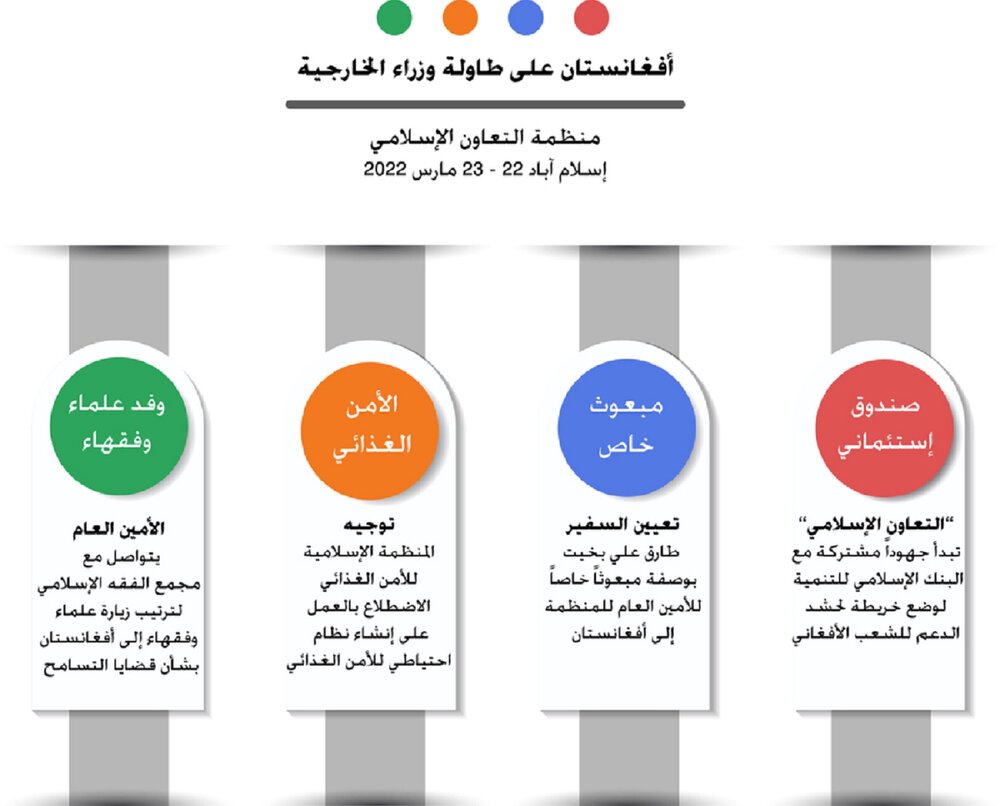Hawzah News Agency – The Forty-eighth session of the Council of Foreign Ministers of the Organization of Islamic Cooperation (OIC), to be held on 22-23 March 2022 in Islamabad, represents the second most prominent OIC activity following the extraordinary meeting of Foreign Ministers held last December on the humanitarian situation in Afghanistan.
On several occasions, the OIC Secretary-General, His Excellency Hissein Brahim Taha, expressed solidarity with the people of Afghanistan. He reiterated the commitment of OIC Member States to help bring peace, security, stability and development to this country. Furthermore, he called on Member States, Islamic financial institutions and partners to expedite humanitarian assistance for the needy.
Since August 2021, Afghanistan continued to witness a difficult humanitarian situation with uncertainty about its future. This prompted the OIC to take several steps towards containing the situation and playing its role in mobilizing support from the international community to the Afghan people, given the specificity of the Organization, which highlights its responsibility in addressing the issues of the Islamic world.
Throughout the Afghan conflict, the Secretary-General continued to affirm full commitment to support an Afghan-led and Afghan-owned peace process, recalling at the same time resolutions passed by the Islamic Summit and the Council of Foreign Ministers meetings on the situation in the country. He also recalled the Makkah Declaration issued in July 2011, at the conclusion of the Conference of International Scholars on Peace and Stability in Afghanistan. Convened by the OIC.
Following the developments in Afghanistan in August 2021, the OIC Foreign Ministers held an extraordinary session in Islamabad on December 19 on the humanitarian situation therein. The Ministers underlined the need for the OIC to play a leading role in delivering humanitarian and development assistance to the people of Afghanistan. The meeting also decided to establish a trust fund for humanitarian affairs under the auspices of the Islamic Development Bank (IsDB), to serve as a means to direct humanitarian aid to Afghanistan, through partnership with other international actors.
Following the decision of the extraordinary meeting to appoint him as a Special Envoy of the OIC Secretary-General to Afghanistan, Ambassador Tariq Bakheet, OIC Assistant Secretary-General for Humanitarian, Cultural and Family Affairs, made several visits to Member States and established contacts with international partners in order to ensure appropriate coordination of aid and assistance efforts. He also visited Afghanistan to follow up on the economic and political participation with Afghanistan.
The December meeting requested the OIC General Secretariat, the IsDB, the Trust Fund, together with relevant UN Agencies, to draw a road map to mobilize actions in the relevant fora to open financial and banking channels to restore liquidity and flow of financial and humanitarian assistance. It also invited them to put in place a mechanism to direct urgent and continued humanitarian assistance to the people of Afghanistan. In addition, the meeting also decided to launch a food security program in Afghanistan. In this context, it requested the Islamic Organization for Food Security to carry out the necessary action by establishing a food security reserve system. It also urged international donors, UN funds and programs and other international actors to contribute generously to the food security program.
The Secretary-General is in contact with the International Islamic Fiqh Academy to arrange a visit by a delegation to be led by prominent religious scholars, jurists and other religious institutions to engage with Afghanistan on issues of tolerance, moderation, equal access to education and women's rights in Islam.
The Foreign Ministers called on Afghanistan to take concrete steps against terrorist organizations and groups, including Al-Qaeda and Daesh and their affiliate groups. They also called on the Afghan authorities to continue working to enhance the inclusion process, including the preparation of a road map to enhance the participation of all Afghans in all aspects of Afghan society's life.


Your Comment